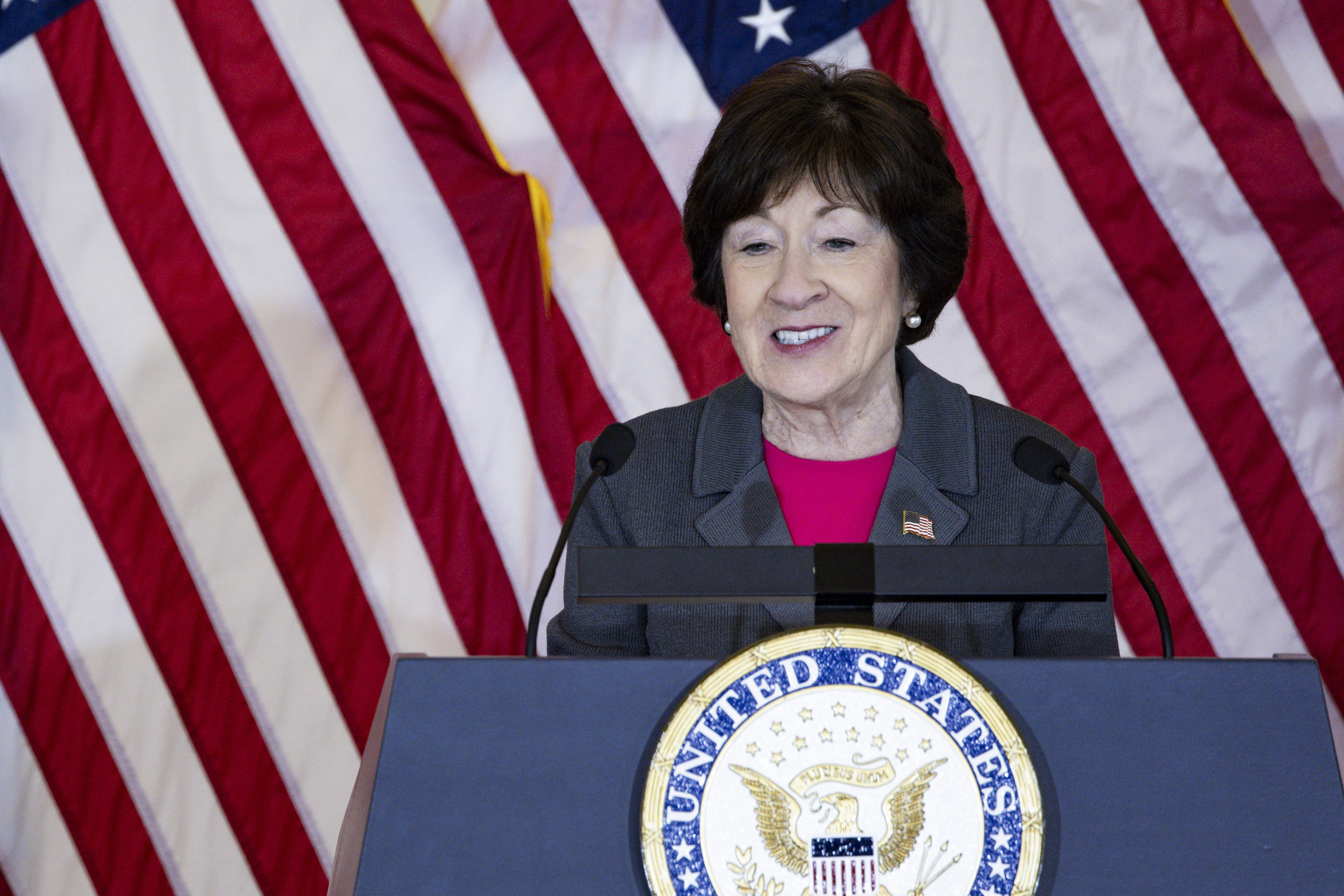Senator Susan Collins’ plans for reelection could complicate Democrats’ path to winning back control of the Senate in the 2026 midterms.
On Thursday, the Maine Republican told the Washington Examiner that she intends to run for reelection in two years. Maine backed Vice President Kamala Harris in the presidential race this year and is viewed as a potential pickup opportunity for Democrats in the midterms, particularly if there is a “blue wave” like the one in Donald Trump’s midterms in 2018.
“I’m focused on the appropriations process, not elections right now, but my intention is to run,” Collins said, the magazine reported.
Newsweek reached out via email to a Collins spokesperson for comment.
Anna Moneymaker/Getty Images
Collins running again would be a boon to Republicans in the midterms. The senator, who has proved popular with Maine voters in the past, will be in a stronger position to hold the seat than other Republican candidates. The state typically tilts blue, but Collins has managed to win over independent and Democratic voters in past elections.
Regardless of whether Collins runs or not, Maine’s Senate race will be among the most contested of the midterms. A president’s party typically loses seats in his first midterms. That means Democrats will be banking on a favorable national environment that could allow them to unseat Collins, who will be a key vote in upcoming battles over GOP-led legislation and Trump Cabinet nominees.
James Melcher, a professor of political science at the University of Maine at Farmington, told Newsweek “there’s no question” that a run by Collins would make it more difficult for Democrats to flip the seat.
“Mainers are ticket splitters to a large degree, and even in a polarized climate, many may vote for her and also vote for a D for governor,” he said. “She’s also generally run well ahead of top of the ticket Republicans, though last time she lost a lot of D and independent support compared to past runs.”
Melcher pointed to Governor Janet Mills as a potential candidate to challenge Collins but said she “might not be interested in going to Washington.”
Representative Chellie Pingree, who represents Maine’s 1st District, may be “too liberal” to defeat Collins, while Representative Jared Golden, who represents Maine’s 2nd District, may be too conservative to win a Democratic primary, he said. Former Maine Senate President Troy Jackson could also be a candidate.
“Announcing she is likely to run now may scare off some potential Democratic challengers, and she knows that she’ll need to raise a lot of money. I think this helps with that,” Melcher said.
“Ds had plenty of money last time and could again if people think that she could be beaten—and [midterm] elections can be hard on the president’s party. Collins’ campaign made much of her deep northern Maine roots and the late-campaign Bill Green ad brought that home,” he said
It would help Democrats to run a “native Mainer from farther north,” he added.
A “kind of issue that makes her walk a tightrope,” like her vote to confirm Supreme Court Justice Brett Kavanaugh, may be the Democrats’ best chance of winning the race, Melcher said. But with the constitutional right to an abortion already settled, he questioned whether a Supreme Court nomination would “pack such a punch.”
Collins was most recently up for reelection in 2020, when she defeated former Maine House Speaker Sara Gideon with 51 percent of the vote, outperforming polls that showed Gideon with a lead in the Pine Tree State.
That was the closest race of her career, as some Democrats soured on Collins during the first Trump administration, particularly following her vote on Kavanaugh. In 2014, Collins won reelection by a 37-point margin.
Notably, Maine uses a ranked choice voting system that allows voters to rank candidates in order of their preference. This could be decisive in 2026 if Democrats hold Collins below 50 percent, as Gideon came close to doing in 2020.
Beyond Maine, there will be few obvious opportunities for Democrats in Senate races. North Carolina, where Republican Senator Thom Tillis is up for reelection, is likely to be their next best opportunity as a flip, though Democrats haven’t won a Senate race in the state since 2008.
Alaska, Iowa, Texas and Ohio (with a special election) are viewed as other states Democrats are likely to invest their efforts in, but all backed Trump by double digits this year, underscoring the difficulty posed by the upcoming Senate map for the party.
Collins will likely take on a prominent role over the next two years, as she is one of a few moderate Republican senators who might provide a check on Trump. She has already expressed skepticism about the president-elect nominating Representative Matt Gaetz to become the next attorney general.
Maine held up for Democrats this year. Harris’ 7-point victory in the state is only 2 points less than President Joe Biden’s 2020 win in the state, despite the national popular vote shifting nearly 6 points toward Republicans.
Meanwhile, Senator Angus King, an independent who caucuses with Democrats, handily won reelection in Maine this month. The race for Maine’s 2nd Congressional District hasn’t been called yet. Golden has a narrow lead in a district Trump easily carried.
Update 11/15/24, 12:18 p.m. ET: This story was updated with comments from professor James Melcher.















